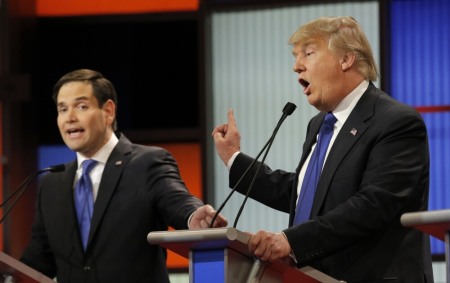No, Donald Trump Doesn't Have Majority Support Among Evangelical Voters

Donald Trump does not have a the support of most evangelical voters. It's a myth that falls flat on its face when one looks at Super Tuesday exit polls in the Southern states, a political scientist concluded.
Trump's message is clear, wrote Charles Krauthammer, a Washington Post columnist, describing the Republican presidential frontrunner and billionaire businessman thus: "I may not be one of you. I can't recite or even correctly cite Scripture. But I will patrol the borders of Christendom on your behalf. After all, who do you want out there — a choir boy or a tough guy with a loaded gun and a kick-ass demeanor?"
Krauthammer then goes on to conclude, "Evangelicals answered resoundingly. They went for Trump in a rout."
However, Darren Patrick Guerra, an associate professor of Political Science at Biola University, counters this proposition, using exit polls.
Trump may have carried a plurality of evangelical voters in some states, but polls also show that, on average, 64 percent of evangelicals in all southern states voted for someone other than Trump, Guerra points out in an article in First Things, adding that a majority, 51 percent, voted collectively for either Sen. Marco Rubio from Florida or Sen. Ted Cruz from Texas, and not Trump.
We must note, he continues, that we're only talking about Republican primaries, while many evangelicals are also Democrats or Independents.
At the Conservative Political Action Conference in National Harbor, Maryland, on Saturday, Rubio said, "If you had told me a year ago that the front-runner at this stage in the Republican campaign would be a supporter of Planned Parenthood, who says he doesn't stand with Israel, who has a long record of supporting government-sponsored health care, I would say, on what planet would that be the Republican front-runner? But it's happened. And I think we have to ask ourselves why we allowed that to happen."
In the exit polls after Super Tuesday, voters in all the southern states, except Oklahoma, were asked, "How much does it matter to you that a candidate shares your religious beliefs?"
Cruz beat Trump in this category by an average of 4 points among those who responded "a great deal," writes Guerra, adding that on average, a majority, 55 percent, of voters who answered "a great deal" voted for either Cruz or Rubio.
Trump, of course, had better support among those who said the religious views of the candidate mattered only "somewhat." and his highest support came from those who said religion did not matter at all. Even in the "somewhat" category, 59 percent did not vote for Trump.
Another question that was asked is, "which candidate qualities mattered most in deciding how you voted today?" Trump is off the charts among voters who said their main concern is "telling it like it is," Guerra writes. Trump received support in some cases up to 80 percent of those voters. But an average of only 13 percent of the voters who said that "shared values" mattered most for them backed Trump. Cruz, on the other hand, averaged 41 percent of "values voters."
This suggests "serious evangelicals" aren't supporting Trump, Guerra concluded.
Cruz appeared on CBS's "Face The Nation" on Saturday after winning the Kansas and Maine caucuses, and said media can expose Trump but they'll do that only later.
"I can't tell you how many media outlets I hear have this great exposé on Donald, on different aspects of his business dealings, or his past, but they said, you know what, we're going to hold it to June or July. We're not going to run it now," he said.
Many have accused the country's liberal media of ignoring Trump's alleged business scandals and past support for liberal policy positions.
Rubio earlier said on CBS News, "If any other candidate in this race had his record, there would be nonstop reporting on it. But, unfortunately, he is being pumped up because many the in the media with a bias know he'll be easy to beat in the general election."




















